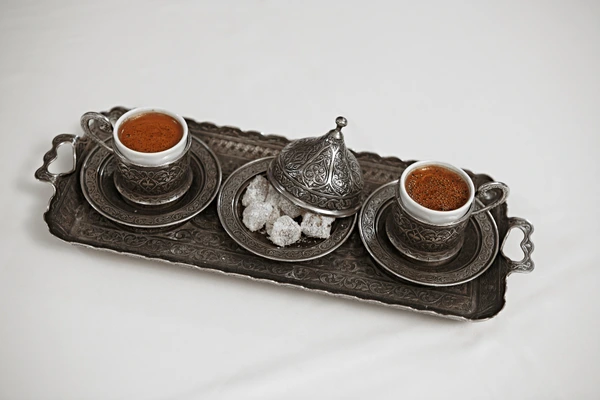Turkish coffee is a ritual that has survived for centuries, carrying with it culture, conversation, and a flavor that no other coffee can quite replicate.
Coffee lovers often ask how it compares to other styles. Is it stronger than espresso? Does it taste anything like Arabic or Greek coffee? Can it really compete with the clean smoothness of a French Press? The truth is that Turkish coffee has similarities with some traditions and sharp differences with others. This guide will break down what makes it unique
What Makes Turkish Coffee Different
These are the key characteristics of Tukirh coffee that make it unique:
Brewing Method
The grounds and water go in together in a small pot, sometimes with sugar, and the mixture is slowly heated until it froths. There is no filter, no pressure, and no paper involved.
Grind Size
The beans are ground so fine that they resemble flour. This powdery consistency is what allows the coffee to mix with the water instead of sitting at the bottom like coarser grounds.
Serving Style
Turkish coffee is always served in small cups with grounds settle at the bottom, so you sip slowly and never finish the very last drop.
Texture and Flavor
The flavor is bold, slightly bitter unless sweetened, and intensely aromatic. The texture is unlike any other coffee, with sediment giving the cup a rustic and unrefined edge.
Turkish Coffee vs Other Brewing Styles
Let’s see how Turkish coffee compares to other popular brewing styles:
Turkish Coffee and Espresso
Turkish coffee is brewed slowly in a cezve with ultra-fine grounds and served unfiltered, giving it a thick, foamy texture. Espresso is pulled under high pressure, creating a smooth crema and a sharper punch. Both are small and strong, but the experience could not be more different.
Read the full breakdown in the Turkish coffee vs espresso comparison.
Turkish Coffee and French Press
French Press coffee is smooth, rich, and easy to brew. You steep coarse grounds in hot water, then separate them with a plunger for a clean cup full of oils and aroma. As you already saw, Turkish coffee goes the opposite way.
French Press delivers more caffeine per serving, but Turkish coffee feels stronger because of its concentrated body
Want the full side-by-side breakdown? Check out the French press vs Turkish coffee comparison.
Turkish Coffee and Moka Pot
The moka pot is a fast, stovetop classic that brews smooth and concentrated coffee with a medium-fine grind. Turkish coffee is completely opposite.
Moka pot coffee usually delivers more caffeine per serving, while Turkish coffee feels stronger because of its dense texture and lingering aftertaste.
Curious to see all the details? Check out the Moka pot vs Turkish coffee comparison.
American Coffee and Turkish Coffee
American coffee is brewed in larger volumes, often with paper filters, and has a mild and clean taste that you can sip all day. Turkish coffee is the opposite. It is a bold, thick, and concentrated cup served in tiny portions.
An American cup usually carries more caffeine simply because of its size, but Turkish coffee feels stronger thanks to its dense texture and intense flavor.
See the full breakdown of American coffee vs Turkish coffee.
Nescafé and Turkish Coffee
Turkish coffee is slow, traditional, and unfiltered, brewed in a cezve with ultra-fine grounds until it forms a rich foam. Nescafé, on the other hand, is instant coffee made from dehydrated brews that turn back into liquid with just hot water and a quick stir.
Caffeine levels can be similar, but flavor is where the difference is clear. See the full comparison in Turkish coffee vs Nescafé breakdown.
Turkish Coffee and Vietnamese Coffee
Vietnamese coffee is slow-dripped through a phin and often mixed with sweetened condensed milk, turning it into a bold yet creamy treat. Turkish coffee is nothing like that. The two brews come from different traditions, use different beans, and even deliver caffeine differently.
Vietnamese coffee usually relies on Robusta beans, which means almost double the caffeine of Arabica-based Turkish coffee. The result is a drink that feels stronger on paper, but the experience could not be more different.
Check out the full guide on Turkish coffee vs Vietnamese coffee.
Turkish Coffee and Filter Coffee
Filter coffee is all about clarity. Water passes through medium-ground beans and a filter, producing a smooth and clean cup that highlights the beans themselves. Turkish coffee is dense, heavy, and unfiltered, which makes the flavor feel stronger even though filter coffee usually carries more caffeine overall.
See the full comparison in the Turkish coffee vs Filter coffee article.
Turkish Coffee and Cuban Coffee
Cuban coffee is brewed in a moka pot and finished with espuma, it carries a caramel-like edge and packs a higher caffeine punch. Turkish coffee leans on richness, thickness, and ritual, with flavor that lingers.
Discover the full breakdown in the Cuban Coffee vs Turkish Coffee comparison.
Cousins of Turkish Coffee
Turkish coffee doesn’t stand alone. Across the Middle East, the Balkans, and the Mediterranean, you’ll find close relatives that share the same cezve-style brewing. Bosnian coffee, Armenian coffee, Greek coffee, and Cyprus coffee are almost indistinguishable in method, with differences showing more in naming and cultural pride than in the cup itself.
Arabic coffee takes a familiar path but often adds cardamom or saffron. Egyptian coffee also follows the same brewing style as Turkish coffee.
For most of these variations, the Ottoman Empire was the main reason behind such a similarity in the way coffee is brewed today.
Key Takeaways
Turkish coffee is unique because it blends strength with ritual. Its thick body, unfiltered texture, and cultural roots make it unlike any other brew. Compared to espresso, French Press, or Cuban coffee, the differences are striking, while its cousins like Greek, Bosnian, and Arabic coffee show how far the tradition has spread.

